- Home
- Jasper Fforde
The Constant Rabbit Page 30
The Constant Rabbit Read online
Page 30
‘OK,’ I said, not sharing his confidence. ‘You do know that Judge John Deed is actually one of the least realistic British TV courtroom drama series?’
‘Is it?’ said Lance, genuinely surprised. ‘That might cause a few problems with your defence – but I’m sure we’ll muddle through. Now,’ he said, ‘which one is the judge?’
‘She’s not in yet. You’ll know it’s her because she’ll be wearing a wig and you’ll be asked to stand.’
I took a deep breath and looked about. The public gallery was full, but there were only two rabbits, neither of whom I recognised.
Once we had stood for the judge and were all then reseated, the usual legal preamble went backwards and forwards while Lance doodled a picture of a carrot on his legal pad. When asked to confirm the plea I had entered earlier, he suddenly stood up.
‘I would like to put forward a motion that all charges be withdrawn.’
The prosecution barrister also stood up.
‘The prosecution will vigorously oppose any downgrading of the charge to manslaughter,’ he said.
‘You didn’t hear me,’ said Lance, ‘we do not seek a reduction to manslaughter, but a dropping of all charges. My client will also change his plea to not guilty to intimate association, for which the court will have to furnish compelling evidence beyond the testimony of witnesses who are either dead or can be demonstrably proven to have anti-rabbit bias by belonging to TwoLegsGood, a membership list of which I will enter as defence exhibit A. Regarding my client’s confession, we will come to that later when I outline how, although not coerced by police, my client was nonetheless coerced.’
There was a stunned silence as Lance deBlackberry finished his short speech. The clerks looked at one another and shrugged, and the two prosecution barristers stared at Lance incredulously.
‘I have to say I’m intrigued but not convinced by this, Mr deBlackberry,’ said the judge, ‘but I will hear your arguments.’
Lance thanked the judge and continued.
‘The crime of murder can only be committed between two humans. Since we know that Mr Ffoxe was of dual taxonomic status and is to be considered a human for the purposes of this trial, it is this status I challenge. Since he was in that house to kill rabbits then it follows that on the evening of his death Mr Ffoxe should be defined as a fox – if he wasn’t, then he would legally not be allowed to murder a rabbit, any more than a human is allowed to kill an anthropomorphised rabbit. The law affords us that protection.’
He paused.
‘So if the victim was legally a fox, then my client’s act becomes simply a man shooting a fox, which he is legally permitted to do under the 1854 Destruction of Countryside Pests Act.’
The prosecution lawyer stood up again.
‘While we concede that legally Mr Ffoxe was required to be a fox to kill rabbits but a human to be a victim of murder, we contend that Mr Ffoxe was legally a human when killed as he had not yet done anything that would define him as a fox in the eyes of the law.’
But Lance was not yet done.
‘This is not a question about when my learned colleague decides – arbitrarily – that a fox is a human or a fox; this is a question of intent. If Mr Ffoxe entered the Rabbits’ house with the sole purpose of terrifying and killing the Rabbit family then he would be very much defined as a fox, and that being so – he cannot be murdered.’
‘Defence counsel may be technically correct,’ said the prosecution, ‘but since we have no sense of Mr Ffoxe’s intent when he entered the Rabbits’ house, then it cannot be proven that he was there to kill rabbits. He may have been wanting to interview them, or offer a warning. Or simply request a glass of water.’
‘A fox does not go into a rabbit’s house with any other intent,’ said Lance, ‘but I concede that his state of mind is unknowable. But will prosecution counsel agree that the victim’s intent has a direct bearing on his taxonomic status?’
‘We do, Your Honour,’ said the prosecution barrister.
‘Good,’ said Lance, ‘then I would contend on the basis of that notion that the perpetrator’s intent must also have a direct bearing on the victim’s taxonomic status. My contention is that since Mr Knox was in that house to do a little fox-hunting, then by learned counsel’s arguments, Mr Ffoxe must be classed taxonomically as a fox – and can therefore be legally killed by a human.’
The prosecution seemed more amused than annoyed by Lance’s words.
‘Does learned council,’ he began in a haughty tone, ‘honestly expect this court to believe that his client was engaging in fox-hunting? I need hardly remind him that this is not a court of conjecture and fantasy, but one that depends upon burden of proof. The defendant’s confession makes no mention of being out for a little fox-hunting, and it seems a stretch for the court to accept this line of reasoning. In none of the photographic evidence can the defendant be seen having a pack of hounds, a horse or a hunting horn, nor was he even dressed in Pink.’
There was a ripple of laughter around the court at this, but not from the rabbits in the public gallery, who had been hanging on Lance’s every word.
‘Ah, yes,’ said Lance, ‘the confession to which I alluded earlier. Mr Knox was in fear of his life from the Hominid Supremacist group TwoLegsGood, who are well known to despise rabbits and are not keen on anyone who kills foxes, and there is strong circumstantial evidence – despite the stories you have read in the media – that it was they who burned the Rabbits’ house down, set fire to Mr Knox’s house, and murdered the Rabbits in their own home. Furthermore, they threatened Mr Knox with a punishment that is well known to be one meted out to those humans who are reputed to side with rabbits – the removal of the thumbs, usually with a bolt-cutter. A threat, the court can see, that was carried out, despite Mr Knox agreeing to confess to everything. His confession, therefore, is unreliable, and should be deemed inadmissible.’
There was a short pause, and someone entered at the back of the courtroom, walked forward and handed a note to the more junior of the prosecution barristers. He read the note, then stood up.
‘If it pleases the court,’ said the prosecutor, ‘I have just received a shocking communication that is pertinent to the proceedings here today. To the effect that opposing counsel, Mr Lance deBlackberry, does not have any professional credentials qualifying him to practise law and has thus fraudulently misrepresented himself, and should be immediately removed from the courtroom pending criminal charges.’
I had seen the junior barrister texting under the table as soon as Lance started to speak, and realised what was going on. Lance had cultivated a sense of incompetence for a very good reason.
‘We would also,’ said the senior prosecutor, ‘move for an adjournment of the proceedings until such time as Mr Knox can be properly represented.’
Lance, however, was not fazed in the least.
‘My legal diploma,’ he said in a loud, clear voice, ‘was sent to the court, which had ample time to review my credentials, but did not. My presence here is simply to undermine my client’s case and ensure Mr Knox be jailed for the maximum time possible. I was permitted and encouraged to represent Mr Knox only so I could fail.’
I expected the judge to intervene, but she did not.
‘But in light of my learned colleague’s accusation,’ continued Lance, ‘I would apply to this court to represent Mr Knox in a lay capacity as a McKenzie friend.61’
‘Ridiculous,’ said prosecution counsel. ‘Mr deBlackberry’s status and qualifications should be reviewed separately, and I must once again request, in the strongest possible terms, that these proceedings be adjourned.’
There was silence and we all watched the judge, who stared at Lance and prosecution council in turn.
‘The court is dismayed to learn that Mr deBlackberry is not legally permitted to speak,’ she said, ‘and since he has done so in the capacity of defence counsel, I find that he is in contempt of this court, and the court will fine him a solitary one pound, to be
paid to the clerk before the end of the day. As regards his plea to become a McKenzie’s friend, I see no reason to deny this, and every reason to permit it. I should also warn prosecution counsel that I have taken note of Mr deBlackberry’s concerns, and will direct my staff to make enquiries. If the concerns prove justified, I fully intend to bring charges against anyone who has attempted to pervert the course of justice. Do you understand me?’
‘Yes, Your Honour,’ said the head prosecution barrister.
‘Good,’ she said. ‘Mr deBlackberry? Please continue.’
Lance cleared his throat and summarised what he had said so far: that I had been coerced and threatened to confess – something that was apparent by my thumbless condition – and that I was actually in the Rabbits’ house to indulge in a little fox-hunting.
‘Yes indeed,’ said the lead prosecution barrister, ‘the thorny fox-hunting issue. Would learned counsel care to demonstrate to the court just how he can prove this ridiculous suggestion, given there were no horses or hounds?’
There wasn’t any laughter this time around, and Lance drew several evidence photographs from a folder.
‘I draw the court’s attention to crime scene photographs 8, 17, 34, 26 and 38. In all of them an owl can clearly be seen. I would also like to draw your attention to photograph 78, in which we see Mr Knox’s burned-out house the following morning, in which an aviary is, again, clearly visible. I also have a signed receipt, here entered as defence exhibit B, to show that said aviary and owl were delivered to Mr Knox the week before.’
He paused to take a sip of water.
‘The Hunting Act of 2004 clearly states that a bird of prey may be used to flush a fox, and a bird of prey – brought by Mr Knox himself – was there in Hemlock Towers when Mr Knox was doing what the law permitted: legally destroying vermin. Once again I appeal to this court to dismiss all charges and release my client.’
‘None of this was in discovery,’ said the prosecution barrister, ‘and shows a flagrant lapse in procedural rectitude.’
‘Agreed,’ said the judge. ‘I find Mr deBlackberry in contempt again, and fine him another pound. As for dismissing the charges against Mr Knox, I find Mr deBlackberry’s argument plausible, and given the grey areas regarding Mr Ffoxe’s taxonomic status, I no longer believe there is enough evidence to satisfy this court that Mr Ffoxe was human when he was killed, and I therefore dismiss the charge of murder. As for the “intimate association” charge, I find that Mr Knox’s confession, in light of the personal attack upon him in prison, should be regarded as tainted, and is also inadmissible. Without it, I cannot see any likely chance of a conviction, and dismiss this charge also.’
There was a collective sigh of annoyance from the humans in the public gallery, and three ‘huzzahs’ from the rabbits. The judge directed her next comments to Lance.
‘Mr deBlackberry, I have been as impressed with your qualities in this court today as much as I have been disappointed by prosecution counsel’s attempt to undermine the rule of law. I will warn you, Mr deBlackberry, that in future you should not misrepresent yourself in court as other judges may not be so tolerant. Consider this a reprimand. Mr Knox, you are free to go.’
The judge then stood up, the court stood up, and ten minutes later I found myself blinking on the steps of the courthouse.
‘My client has no comment at this time,’ said Lance as we made our way through the phalanx of reporters to a waiting RabCab, in this instance a charmingly ugly 1973 Ford Gran Torino.
‘Nffiffr hrff niffrh?’ asked the cabbie, who was an old flea-bitten buck with a single hole in his left ear that was so large he must have duelled with a howitzer.
‘Colony One,’ said Lance, ‘and step on it.’
The cabbie did indeed ‘step on it’, but only in a strictly relative way: he ramped it up to a heady 40 mph, only 12.62 mph below the all-time self-piloted rabbit land speed record. I think I realised then how they made their cars last so long.
‘Is that wise?’ I asked. ‘I’m probably the last person who should be seen anywhere near the May Hill colony.’
‘You need to be there,’ said Lance.
‘Why?’
‘Because Bunty has foreseen that the endgame is near – and we need all the help we can get.’
Rabbit Colony One
A three-dimensional mapping of the warrens beneath Colony One revealed a labyrinthine network of tunnels that were, astonishingly, more tunnel than soil, and instigated a new branch of mathematics that was later used to greatly improve shock-absorbing foam.
We sat in silence as we drove up and out of Hereford towards Ross-on-Wye, and I didn’t speak until we were past Harewood End.
‘That was really impressive in court,’ I said. ‘Thank you.’
‘Don’t thank me,’ he said, ‘thank the Venerable Bunty and Mr Finkle. It was their overall plan. I just spoke the words, trippingly off the tongue.’
‘Are you going to study law for real?’ I asked.
‘Maybe,’ said Lance, ‘but it’ll take more than just rabbit lawyers – we need rabbit judges to see our point of view. When every legal system on the planet is skewed against any non-human animal group, it’s almost impossible to make any headway. We’d have liked to help – the Rabbit Way has a lot going for it – but maybe humans just aren’t grown up enough to be able to share the planet quite yet.’
‘Why help me out at all?’ I asked. ‘I mean, you could have just left me to my life sentence and it would be no down off anyone’s ears.’
‘That’s true,’ said Lance, ‘but the second circle of Lago is about restorative self-justice. Responsibility for one’s errors, choice-consequences and transgressions. You didn’t kill Mr Ffoxe, so you shouldn’t go to prison. Luckily, it’s relatively easy to outfox the British legal system. Your billionaires do it all the time. The way we see it, London is just one massive money-laundering scheme attached to an impressive public transport system and a few museums, of which even the most honest has more stolen goods than a lock-up garage in Worcester rented by a guy I know called Chalky.’
We chatted for a while and I learned that Lance’s appearance in court had only been his first criminal case, but not his first civil plea. Although there was not yet a ruling, the civil case revolved around whether a receipt from a pet shop for Blackberry, Lance’s Petstock forebear, could be considered proof of pre-Event residency, and if so, did that count as documentation and thus make the fifty thousand or so rabbits who carried the deBlackberry surname legally British.
‘Will it work?’ I asked.
‘It’s legally sound,’ he said, ‘but with UKARP’s shifting legislative goalposts, probably not.’
The cabbie had the radio on as we drove, and I featured prominently on the news. The general consensus was that a ‘shady rabbit lawyer’ had ‘exploited a loophole’ to ‘get me off’, a loophole which fox legal minds were currently trying to close – and there was even talk of appealing the judge’s decision as she had clearly promoted ‘an appallingly biased anti-human and pro-rabbit agenda’. Either way, it didn’t appear as though this was over.
As we approached Colony One we could see a huge military build-up had occurred. There were lorries and tanks parked amongst the trees, with artillery pieces positioned in the surrounding fields, gun crews at readiness.
‘This is as far as this old rabbit goes,’ said the cabbie, as the access road to the colony had been barricaded about a mile from the main entrance. There was, in fact, a good-sized crowd of humans present and a peace camp seemed to have been set up. Banners proclaiming equal rights for all animals and support for vegetarianism and sustainability were prominently displayed, and several others which were only passive-aggressively anti-fox, as it really wasn’t wise to piss them off. The police were present also, leaning on their riot shields and looking bored, while groups of foxes sat around on deckchairs, listening to Caruso on a wind-up gramophone, sipping Chianti and playing cribbage.
‘You need to take
this in with you,’ said Lance, handing me a sealed cardboard box about a foot square.
‘What is it?’
‘Oh, just supplies,’ he said, ‘but vital for the effort.’
‘OK,’ I replied, now uneasy. ‘But how am I going to get in?’
‘Go straight in the door,’ he said. ‘My guess is they won’t dare touch you.’
I squeezed his two paws with my two thumbless hands. It actually felt more comfortable and connected, as though our hands/paws interlocked more fully and completely, and with them, an understanding.
‘Goodbye, Peter,’ said Lance with an air of finality, ‘it’s been a lot of fun. I may see you on the other side.’
‘What do you mean?’
‘You’ll see.’
I climbed out of the car, which drove off without urgency, and walked up to the barrier, where several police officers were talking in a nervous gaggle. For the most part, they stayed separate from the Taskforce. When mud gets thrown around, the further you are away, the less likely it will stick.
‘Sorry, sir,’ said the policeman in charge, a superintendent, I think, ‘no entry to Colony One at present.’
‘My name’s Peter Knox,’ I said, ‘I need to speak to the fox in charge.’
The superintendent either hadn’t followed the breaking news, didn’t see how it might be relevant or couldn’t care, so he simply repeated what he had said a little more forcefully: that the colony was closed.
Luckily for me there were also military personnel standing just a little way off and the ranking officer, a brigadier, strolled over and asked the superintendent for a word. It was several words in the end, for they were chatting for five minutes, and eventually the superintendent made a call on his mobile, nodded several times and then walked back to me.
‘You’re allowed in,’ he said, ‘under military and not civilian escort. They’re sending a car for you.’

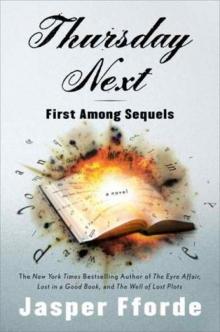 First Among Sequels
First Among Sequels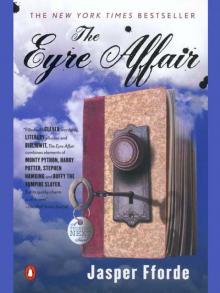 The Eyre Affair
The Eyre Affair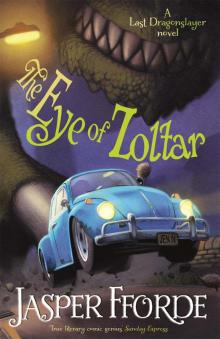 The Eye of Zoltar
The Eye of Zoltar The Woman Who Died a Lot
The Woman Who Died a Lot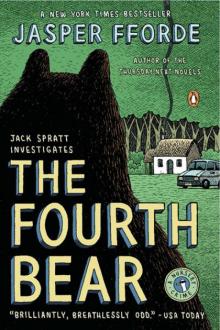 The Fourth Bear
The Fourth Bear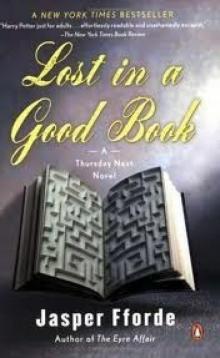 Lost in a Good Book
Lost in a Good Book Something Rotten
Something Rotten The Well of Lost Plots
The Well of Lost Plots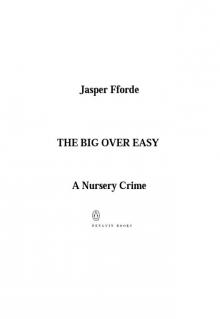 The Big Over Easy
The Big Over Easy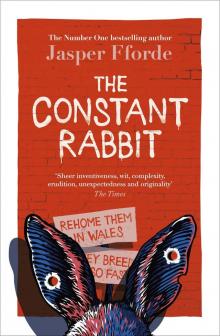 The Constant Rabbit
The Constant Rabbit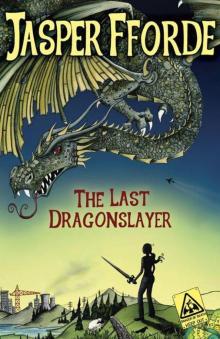 The Last Dragonslayer
The Last Dragonslayer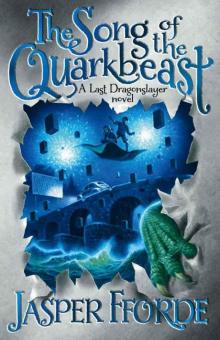 The Song of the Quarkbeast
The Song of the Quarkbeast One of Our Thursdays Is Missing
One of Our Thursdays Is Missing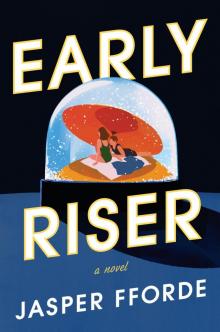 Early Riser
Early Riser Early Riser_The new standalone novel from the Number One bestselling author
Early Riser_The new standalone novel from the Number One bestselling author Something rotten n-4
Something rotten n-4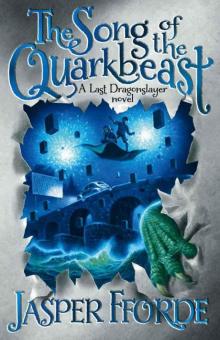 The Song of the Quarkbeast tld-2
The Song of the Quarkbeast tld-2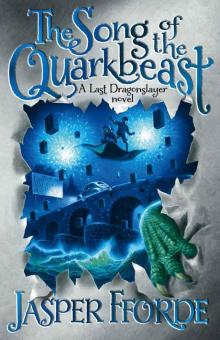 The Song of the Quarkbeast: Last Dragonslayer: Book Two
The Song of the Quarkbeast: Last Dragonslayer: Book Two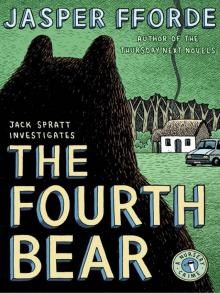 The Fourth Bear nc-2
The Fourth Bear nc-2 Lost in a Good Book tn-2
Lost in a Good Book tn-2 The Well of Lost Plots n-3
The Well of Lost Plots n-3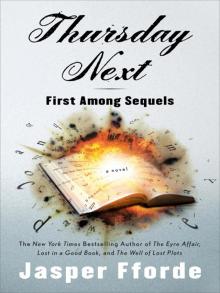 Thursday Next in First Among Sequels
Thursday Next in First Among Sequels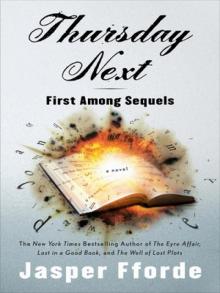 First Among Sequels tn-5
First Among Sequels tn-5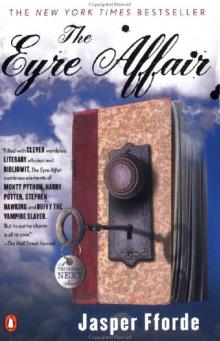 The Eyre Affair tn-1
The Eyre Affair tn-1